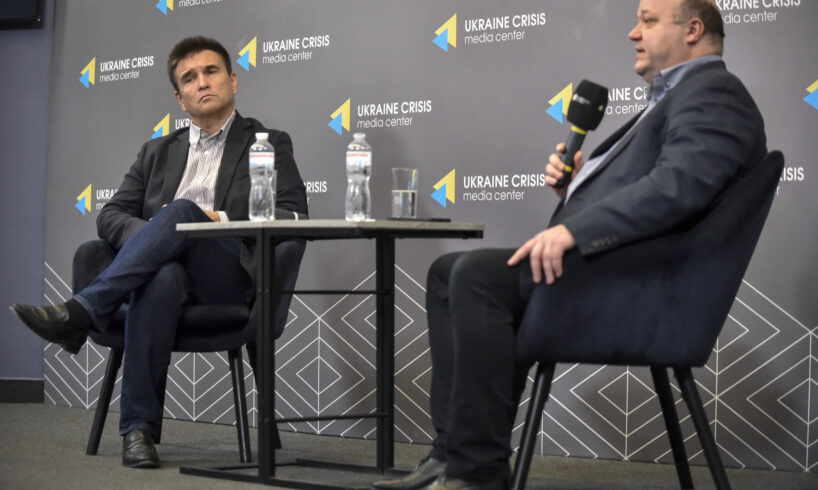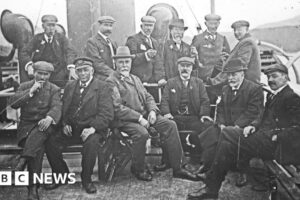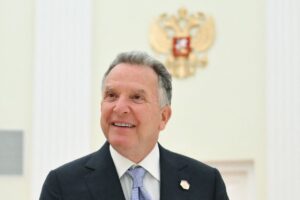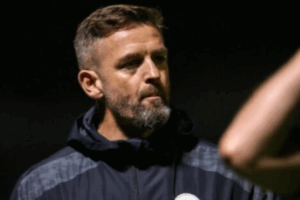
The next meeting as part of the special project Geopolitical Dialogues with Valeriy Chaly began with a minute of silence. After that, the Chairman of the Board of the Ukrainian Crisis Media Center emphasized the special significance of October 1: “This day is important in the history of the Ukrainian Cossacks – it is the Day of the Intercession (of the Mother of God). But the main thing for us is that this is the day of the defenders of Ukraine, and we must first and foremost remember all those who gave their lives for Ukraine.”
To discuss the most pressing issues in foreign policy discourse, Valeriy Chaly invited his colleague, Pavlo Klimkin, Ambassador Extraordinary and Plenipotentiary, Minister of Foreign Affairs of Ukraine in 2014-2019.
Where are we now?
According to the guest, the Russian leadership lost momentum since the point when, as they believed, time was working in their favor. And this opinion is now shared by many, both among Western politicians and experts, as well as non-Western ones. Today’s Russian economic reality is already struggling to maintain the intensity of both military operations and the financing of domestic programs. There are almost no easy ways to keep the economy stable without sacrificing something.
The agreement that oil prices should not rise fundamentally is one of the few stable variables in today’s global economy. All this means that while Donald Trump’s administration still has time and he understands perfectly well that time is on his side in terms of the opportunity to talk to the Russian leadership, for the Kremlin, this logic has changed,” Pavlo Klimkin noted.
Valeriy Chaly, for his part, drew attention to the change in the information narrative.
“The statements that have been made in recent days, and, surprisingly, in the Western press, are that Ukraine can win. Until recently, many people insisted that Ukraine had no chance. Orbán said in an interview that Russia had already won and that Ukraine had no chance. And then suddenly the US president speaks out, and yesterday the head of the Pentagon made a strong statement. All that remains is to wait for action,” he said.
What about Russian oil transit?
The former minister believes that this issue definitely needs to be raised, but first we need to examine whether we are moving towards obtaining European support and some kind of decision within the EU, so that Ukraine can neutralize all political risks, or whether we are moving down the legal route.
“When considering this issue, I would not focus solely on the legal aspect. There is a lot of politics involved here, both public and non-public. Sometimes we all have to make difficult decisions so that issues that are more important for Ukraine are not blocked or delayed,” Pavlo Klimkin explained his position.
In response, the interlocutor suggested asking ordinary Ukrainians what is more important to them: steps towards Ukraine’s European integration or victory in the war.
“They will tell you that victory in the war is more important. We understand that this war could escalate into a European war, and then we will forget about all these issues altogether and finally focus on stopping the war in Europe,” Valeriy Chaly emphasized. “And Ukraine, which is most interested in this, now seems to be giving priority to post-war issues. Strategic membership in the European Union is very important, but it is possible not to achieve this membership after all.“
The situation in Moldova and the path to the EU
Pavlo Klimkin admitted that he had expected precisely these results from the parliamentary elections in the neighboring country, but he called for caution in considering future prospects. He explained this by several factors, primarily Russian influence: “Moldova itself is not as critical to them as we are, since we are existentially important to Russian mythology and ideology, but they have enough leverage in Moldova. As I understand it, the Russian elites are currently reviewing this strategy for the foreseeable future, including replacing the people responsible for it.”
As for the assessment of the actions of the republic’s leadership, the diplomat called them quite reasonable and, in some cases, even decisive. However, the country’s economy is not easy, and a lot depends on it.
Valeriy Chaly asked his colleague’s opinion on how Ukraine should proceed in negotiations on EU accession – alone or together with Moldova? The latter replied that he was in favor of the second option and shared his vision of communication with Ukrainians on issues of European integration.
“When talking about the European Union, I would not engage in what we like to call advocacy. I would simply talk about how we need to change our lives. The Association Agreement is one-twentieth of what is currently on the agenda. And I would not start from a positive or negative perspective, but from the reality of how we can become better for ourselves, not for the European Union. And this is not an easy conversation. To do this, we need Europeans who would work with us directly. And they, by the way, want to do this, but they also do not yet know how to do it,” Pavlo Klimkin admitted.
Should Ukraine sell weapons?
The head of the UCMC board expressed skepticism about the Americans’ interest in spending tens of billions on the purchase of Ukrainian drones. In response, the former head of the Foreign Ministry said that the Americans are indeed interested in buying not only experience and certain technologies, but also hardware in this context.
“This is because new concepts envisage the use of a significant amount of weapons on the battlefield, and not only high-tech weapons, but also those that work in conjunction with high-tech weapons. For example, various drone platforms. This is an opportunity to use a large number of them by linking them into a single system based on a unified strategy. Tomorrow, most drones will be controlled by artificial intelligence, and this is already happening. Starting next year, even simple drones will be equipped with artificial intelligence,” Pavlo Klimkin clarified.
At the same time, he agreed that $50 billion is a large amount even for high-tech weapons. When it comes to such sums, these are not even medium-term programs, but long-term ones in terms of cooperation.
Conclusions
Pavlo Klimkin: “I see the developments of the last three months or so as realistic and positive, definitely not negative. Based on many of the things we have touched upon today, and many things we have not touched upon, I have come to the following conclusion. Whether this will be sustainable is still a question that again depends on many factors. Nevertheless, I see no real reasons for unambiguous pessimism, let’s say, since June.”
Valeriy Chaly: “ We will see in the coming months what Ukraine will receive in terms of weapons, what decisions will be taken in Europe regarding sanctions, and thirdly, what is really positive is the change in rhetoric, that suddenly people have started to believe in Ukraine’s victory. If this is driven by a desire to help Ukraine shorten the time to victory, I am all for it, but this will likely become clear next year.”





